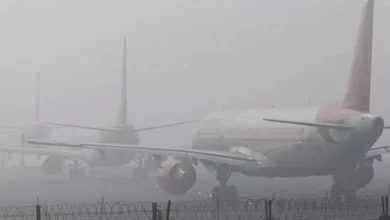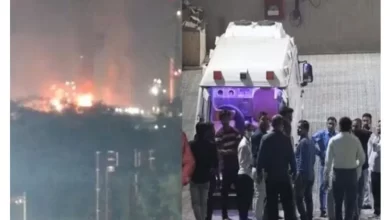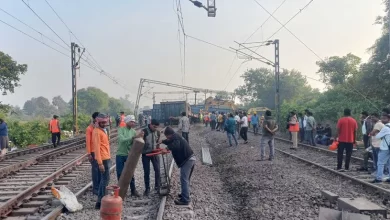AQI hits 450; CAQM says get all BS-IV diesel vehicles off the roads

The central pollution control authority on Thursday called for a series of sweeping new restrictions such as banning the entry of diesel trucks and use of older private diesel vehicles, and urged government to consider shutting schools and shifting offices to remote working as the Capital’s air quality plunged to its worst level this year.
The central pollution control authority on Thursday called for a series of sweeping new restrictions such as banning the entry of diesel trucks and use of older private diesel vehicles, and urged government to consider shutting schools and shifting offices to remote working as the Capital’s air quality plunged to its worst level this year.
The 24-hour average Air Quality Index (AQI) clocked in at 450 at 4pm and by 9pm, it rose to 454, with the Commission for Air Quality Management (CAQM) noting that the situation would worsen further in coming days as farm fires, one of the principal factors behind the spike, continue to rage in Punjab.
“As per the forecast, the AQI in Delhi is likely to be in the ‘severe+/severe’ category in the next couple of days owing to calm winds and stable atmospheric conditions. Therefore, in an effort to prevent further deterioration of air quality, the GRAP Sub-Committee decided that all actions as envisaged under Stage IV of GRAP be implemented in right earnest by all agencies concerned,” CAQM said in its order.
Implementing this order will now be up to the Delhi government. An official, who asked not to be named, said environment minister Gopal Rai will hold a high-level review meeting at 12pm on Friday to review the implementation of measures under Stage IV.
“The meeting will consist of environment department officials and from other departments and agencies that are required to implement the order,” the official said.
The fourth stage of the graded response action plan (Grap) to fight pollution includes a ban on all diesel trucks and private diesel cars unless they comply to the newer Bharat Stage VI (BS-VI) emissions norms. All linear construction projects such as highways, roads and flyovers will also have to stop, the order issued by CAQM said.
“There is a likelihood of improvement in air quality from November 6 (Saturday), 2022 onwards owing to favourable wind speed and wind direction, which at present is predominantly north-westerly. The subcommittee shall again review the air quality scenario on November 6 and take appropriate decision on Grap measures to be taken thereafter,” said RK Agarwal, director of the CAQM sub-committee on Grap in the order.
Thursday’s deterioration in the air quality was triggered by a massive surge in farm fires in recent days. On Wednesday, Punjab, Haryana and Uttar Pradesh recorded a combined fire count of 3,825 fires, while it was 2,834 fires on Thursday. Of these, Punjab alone accounted for 94%. The Aam Aadmi Party is in power in both Delhi and Punjab.
As a result of the Wednesday surge, the contribution of stubble burning to Delhi’s PM 2.5 (ultrafine particle) concentration spiked to 34% on Thursday — a sharp rise from a contribution of 12% on Wednesday, according to the System of Air Quality and Weather Forecasting And Research (Safar). This is the highest single-day contribution this year, Safar data shows.
The CAQM said state governments “may consider additional emergency measures like closure of schools, colleges and educational institutions, closure of non-emergency commercial activities and plying of vehicles on odd-even basis among others,” the order said.
For now, schools in Delhi in their own capacity have curtailed outdoor physical activity and enforced the usage of N95 masks among students. A few schools have also switched to online classes.
In neighbouring Noida and Greater Noida, the Gautam Budh Nagar administration ordered only online classes be held up to class 8 for all boards until November 8. It also asked schools to curtail the outdoor activities of senior students and to stop in-person classes for them as well if possible. Haryana, like Delhi, was set to decide on curbing in-person classes on Friday.
The body clarified that among the diesel vehicles banned, those involved in providing emergency or essential services will be exempt from this ban. It further asked children, elderly and those with respiratory, cardiovascular, cerebrovascular or other chronic diseases to avoid outdoor activities and stay indoors as much as possible.
Gufran Beig, founder project director at Safar said AQI across NCR was “severe” at almost all locations, with Noida faring the worst as per their data.
“We have also seen some significant changes in the chemical composition of PM 2.5 from the days when stubble contribution was nil to now. The share of black carbon has increased from 7.6% to 14%, Organic carbon has increased from 22% to 32%, chlorine increased has from 1.1% to 1.8% (responsible for visibility reduction) and potassium has changed from 1.5% to 2.4%,” said Beig, stating these were clear indicators of the impact of farm fire emissions and that dispersal of existing pollution levels will only take place significantly from Saturday evening.
“Wind speed will increase and allow dispersion from Saturday evening. Before that, no significant dispersion will take place as impact from stubble burning is high,” he added.
Anumita Roychowdhury, executive director, research and advocacy at the Centre for Science and Environment (CSE) said while these extreme and emergency measures were disruptive in nature, they were unavoidable in a situation where the AQI is so high. “It is important to keep reviewing these measures as they are disruptive in nature and cannot be sustained for too long. Since it is linked to the AQI, when the AQI drops, they can be removed. However, it is also important to stress on the fact that such disruptive measures would not be needed in the first place if round-the-year action was taken and the AQI was prevented from reaching such a threshold,” she said.
Reacting to the high farm fires in Punjab this season, Union environment minister Bhupender Yadav on Thursday stated he was not satisfied with the mitigation measures taken by the state government.
He pointed to the high number of farm fires in Punjab, sand said that the machinery subsidised and provided by the Centre was not being utilised, and that a bio-decomposer that the Delhi government contended was effective did not seem to be making any significant impact on the ground in Punjab.
Chief minister Arvind Kejriwal on Wednesday contended it was not right to blame one state (Punjab) and called for the Union government to resolve a problem that affected all of north India.







